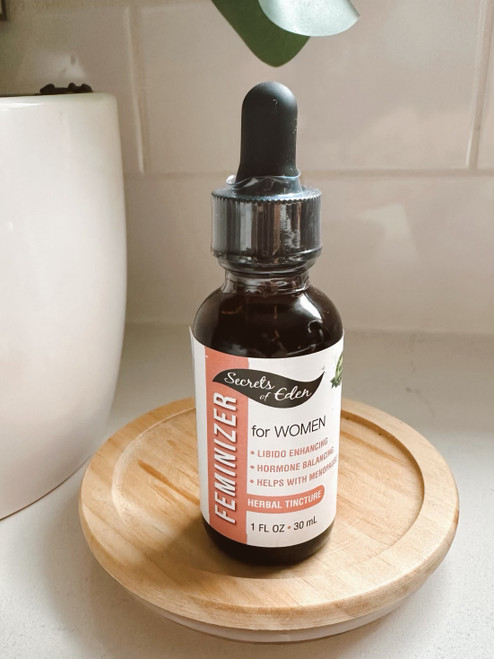Product Overview
Feminizer
Secrets of Eden
Exclusive blend of 5 hormone balancing Organic herbal tinctures.
Black Cohosh
Oat Straw
Wild Yam
Dong Quai
Lifting to Libido
Balancing to hormones.
Great for premenstrual relief.
Helps with menopause
Dong Quai is a member the celery family of plants. The herb produces white flowers with a green hue that bloom from May to August, and the plant is typically found growing in moist mountain gullies, meadows, along river banks and in coastal areas. The root of the Dong Quai plant has a number of medicinal appications.
Dong Quai, or traditionally known as Chinese Angelica, is commonly used for treating conditions in females in both America and China. Traditional Chinese medicine, frequently refers to Dong Quai as female ginseng.
Dong quai is often included in herbal combinations as a treatment for abnormal menstruation, including suppressed menstrual flow, dysmenorrhea (painful menstruation), and uterine bleeding. However it is not recommended, according to Chinese medicine, for treatment of menopause, or related symptoms such as hot flashes. And contrary to some recent theories, donq quai is not a replacement for estrogen, nor does it offer any hormone-like effects on the body. Its reported ability to relieve menstrual related symptoms and conditions is believed to stem from its power to quell spasms in the internal organs. Traditional Chinese medicine employs dong quai in treating both men and women with cardiovascular disease, including symptoms of high blood pressure and problems with peripheral circulation.
Dong quai's constituents can stimulate the central nervous system whereby alleviating weakness and frequent headaches associated with menstrual disorders. Dong quai also strengthens the internal reproductive organs, helps with endometriosis and aids in internal bleeding or bruising. It also relieves symptoms of menopause such as vaginal dryness and hot flashes.
Dong quai also works as a blood purifier, it has been known to promote blood circulation and provide nourishment to the blood in both sexes. It has a high iron content and may assist in preventing iron deficiency and anemia. Studies show that it can aid in regulating blood sugar levels and in lowering blood pressure.
Dong quai has slight sedative properties, which may relieve stress and calm nerves. It has been used to stimulate a mother's uterus during labor, treat insomnia, relieve constipation and treat migraine headaches.
Black Cohosh’s effects were first discovered by Native Americans. From its introduction to early settlers until today, Black Cohosh remains a popular and effective supplement for a variety of gynecological problems. Its estrogenic effect renders it particularly useful for menopausal symptoms.
Symptoms of menopause vary but the most frequently recognized ones are night sweats, irritability, hot flashes, anxiety, depression, loss of sexual drive, weight gain, and insomnia. Black Cohosh has been studied extensively with results consistently showing Black Cohosh to be effective at alleviating a variety of menopausal symptoms. One study even identified Black Cohosh as a reasonable alternative for estrogen replacement therapy (ERT) in women who either declined ERT or were unable to follow an ERT regimen.
Additionally, Black Cohosh may be helpful to the 75% of women who suffer with PMS symptoms each month. Two additional ingredients in Black Cohosh Extract Plus also assist with these symptoms. Dong Quai is a traditional Chinese herbal medicine believed to help ease cramping among other symptoms. Chasteberry, also called Vitex, may ease PMS symptoms by helping restore normal estrogen to progesterone levels.
Oat Straw ranks among the most important restoratives for conditions of the central nervous system. Because of its selective action upon the nervous structure which supplies the reproductive organs, it will be found to allay nervous excitement, nervous palpitation of the heart, insomnia and mental weakness. It has been shown to have a positve effect upon male impotence.
Damiana (Turnera diffusa or Turnera aphrodisiaca) is a woody plant with several stems that grows in hot and humid parts of Mexico, Central and South America.
Having been first introduced in the USA in 1874, Damiana herb has a long and interesting history of use in the folk medicine. The indigenous population praises the plant for its antidepressant, diuretic, tonic, hypoglycemic, and antibacterial properties. Ancient Mayas and Aztecs used Damiana as a general tonic to improve health condition.
It was also used by the tribes as an aphrodisiac, because people thought the plant had the ability to improve sexual function. There was a ceremony, during which Damiana leaves were burnt. Ancient people thought this ritual aroused sexual desire and helped lovers perform much better.
Ancient people thought that Damiana was effective in calming nerves and relieving depression and anxiety. They smoked plant’s leaves to relax. Smoking Damiana is practiced even nowadays. Some researchers say that the effect from smoking the herb’s leaves on human brains is similar to the influence of cannabis.
It is interesting to note that boosting sexual desire is not the only property of Damiana. Native tribes also use it to treat constipation and digestive problems, as well as gastric ulcers, menstrual irregularities, and bed-wetting.
Chemical structure of Damiana is rather complicated. The herb is rich in many active components that account for its main medicinal uses and applications. One of the main constituents is volatile oil that is found in the leaves of Damiana. This oil consists of at least 20 elements, including 1.8-cineole, p-cymene, alpha- and beta-pinene, thymol, alpha-copaene, and calamene. The leaves are also a source of flavonoids, tannins, damianin, beta-sitosterol, arbutin.
that
Enhances Hormonal Balance
and Lifts Libido. 30 ml. Secrets of Eden.
ONLY $18.95


